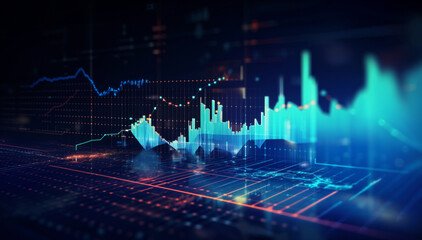The debate over whether trading futures constitutes gambling has persisted in the complex world of finance, where reward and risk must coexist in a precarious equilibrium. Understanding the complexities of future trading in Indian stock market is essential as the world’s financial markets develop and attract a wide range of participants, from institutional investors to individual traders.
This article explores this topic in-depth, breaking down the components of future trading in Indian stock market, its traits, and the crucial distinctions that distinguish it from gambling.
Defining Stock Market Futures: A Primer
It is crucial to comprehend the fundamentals of future trading in Indian stock market before getting into the meat of the issue. Essentially, future trading in Indian stock market entails making bets on how much various financial assets, like stocks, commodities, or currencies, will cost at a specific future time.
These financial derivatives, also referred to as futures stock market contracts, are arrangements between two parties to purchase or sell an asset at a particular price on a specific date in the future. Hedging against probable price volatility is frequently the main goal of futures trading, which reduces risk exposure.

The Differences Between Trading and Gambling
The connections between stock market futures trading and gambling could be obvious at first look. Participants in both activities take a financial risk in an effort to acquire a competitive advantage. However, a deeper look reveals significant differences that separate the two.
1. Risk reduction and strategy:
The players’ strategic approach is one of the key distinctions between futures stock market trading and gambling. Success in the field of future trading in Indian stock market generally depends on a well-thought-out plan, meticulous analysis of movements of the market, and in-depth knowledge of economic data.
Participants are provided with approaches and tools to help them make wise judgments. Contrarily, gambling is largely dependent on luck. Games of chance lack the strategic component that makes futures trading unique, such as roulette or slot machines.
2. Market Information and Knowledge:
Information, which is the lifeblood of financial markets, is essential to stock market futures trading. Participants in future trading in Indian stock market examine a wealth of economic statistics, geopolitical developments, and company-specific data to create well-informed projections.
Here, the proverb “knowledge is power” holds true. On the other hand, gambling rarely necessitates a complex comprehension of underlying dynamics. While luck is crucial, there is a definite lack of in-depth market information in gambling.
3. Control and supervision
Stock market futures trading’s regulatory structure distinguishes it significantly from gambling. The Securities and Exchange Board of India (SEBI) regulates future trading in Indian stock market as well as the operation of the derivatives market.
SEBI’s strict rules and regulations promote transparency, fairness, and investor protection. Future trading in Indian stock market gains credibility through the presence of a strong regulatory framework, a quality lacking in many gaming activities.
4. Objectivity and Economic Role
Future trading in the Indian stock market serves two essential economic functions: price discovery and risk management. Businesses, farmers, and investors use futures stock market contracts to protect themselves from unfavorable price changes and maintain some level of stability in volatile markets.
This economic benefit goes beyond gambling, which is typically a zero-sum game in which one player’s gain is inextricably connected to another’s loss.
Managing the Ambiguities
While the foregoing distinctions offer a fundamental grasp of the differences between future trading in Indian stock market and gambling, it is important to recognize that there are murky regions. There are many nuances and exceptions, as with any complex topic.

1. Investing vs. Speculation
The role of speculation in future trading in Indian stock market is at the center of the argument. Although speculation is a necessary component, it is important to distinguish between speculative behaviors that are guided by thorough analysis and those that are only motivated by naive optimism.
Given that it incorporates market knowledge and risk management, a well-informed speculative strategy is more comparable to investing than to gambling.
2. Psychiatric variables
Future trading in Indian stock market and gambling can have psychological components.
In these areas, emotions such as greed, fear, and impulsivity can influence decision-making. However, future trading in Indian stock market frequently highlights emotional restraint and self-discipline as essential elements of a winning strategy, which helps to temper the impulsive inclination that can be more pronounced in gambling situations.
More: Trading vs Investing: What is the Difference between Trading and Investing
Knowledgeable Participation
Finally, categorizing stock market futures trading as gambling oversimplifies a nuanced environment. Although there is risk and some degree of uncertainty involved in both occupations, it is important to note the differences in terms of strategy, market information, legislation, and purpose.
Within the financial ecosystem, SEBI governs and legitimates future trading in the Indian stock market, ensuring its regulation. Research-based and strategically-minded engagement can result in positive outcomes.
There will surely be a discussion over the nature of trading activity as long as the global financial markets are developing. People who trade in the futures stock market can better navigate the convergence of risk and opportunity when they have a keen grasp of the subtleties and distinctions.
The manner, competence, and understanding with which participants maneuver through the complex web of the financial world ultimately determine if trading stock market futures is comparable to gambling.
Understanding and Managing Volatility: A Key Aspect of Futures Trading
It takes a keen understanding of volatility’s function to navigate the waters of the future trading in Indian stock market panorama. Volatility is a double-edged sword that can amplify gains and intensify losses. Sudden price movements frequently characterize it. Stock market futures traders must comprehend the nature of volatility and use tactics to fully exploit its potential.
1. Risk Control in an Uncertain Environment
Even the most experienced stock market futures traders may become uneasy due to volatility because it introduces an element of unpredictability. However, risk management strategies protect against excessive exposure.
Unexpected fluctuations in the stock market futures can be lessened by using strategies including placing stop-loss orders, diversifying portfolios, and using position sizing procedures. Trading professionals understand uncertainty while working to minimize its consequences by adding risk management into their tactics.
2. Opportunity in Volatility
Contrary to popular belief, volatility can also be seen as a chance rather than a danger. Increased volatility can result in profitable price differentials when it comes to future trading in Indian stock market, giving traders the possibility to profit from market disruptions.
Certain tactics, like options trading, flourish in tumultuous conditions and enable users to profit from price changes without necessarily holding the underlying asset.
A Tight Balance Between Technical Analysis and Fundamental Analysis
Stock market futures traders base their techniques on two unique pillars: the fields of technical analysis and fundamental analysis. Finding the ideal balance between the two approaches is essential for making well-informed decisions in the future trading in Indian stock market sector, even though each methodology offers distinctive insights.
1. Decoding Price Patterns Through Technical Analysis
In order to predict future movements of the price, technical analysis focuses on the investigation of price patterns, volume trends, and different technical indicators. Technical analysts search through previous price data to find patterns that can point to upcoming trends in trading.
Although technical analysis offers insightful information, it is important to understand its limitations because it might not account for all market variables.
2. Uncovering Underlying Value through Fundamental Analysis
By examining corporate finances, market patterns, and macroeconomic factors, fundamental analysis delves deeper into an asset’s true value. This strategy aims to reveal an asset’s true value so that traders can make decisions based on that value.
Fundamental analysis can provide insight into the state of the businesses and industries that form the basis of futures contracts, which is particularly pertinent to future trading in Indian stock market.
3. Bringing the Two Approaches Together
While the perspectives offered by technical and fundamental analysis are different. Combining the two might result in a more thorough understanding of the dynamics of the market.
A trader who combines technical knowledge with an understanding of the fundamentals can make well-rounded decisions when engaging in future trading in Indian stock market. These decisions should take into account both short-term trends and long-term value.
A Blessing and a Curse in Leveraging Leverage
Leverage is a key component of future trading in Indian stock market and has the ability to magnify both gains and losses. It alludes to the practice of using borrowed money to raise the possibility of an investment’s return. However, the wise use of leverage necessitates caution and a thorough comprehension of its repercussions.
1. The Amplifying Impact
In futures trading, leverage has the ability to double profits, allowing traders to hold greater positions with relatively less cash. This characteristic attracts investors looking for high profits for future trading in Indian stock market. Leverage also multiplies losses, so a single negative market movement can wipe away a sizable percentage of the trader’s capital on the other hand.
2. Risk and Reward: A Balanced Approach
When leverage is engaged in future trading in Indian stock market, the concept of risk and reward takes center stage. Traders must choose their level of risk tolerance and use leverage carefully. It takes careful risk management tactics to strike the correct balance between prospective benefits and allowable losses.
The Emotional Front Line in Futures Trading: The Psychological Front Line

The psychological battlefield that characterizes both future trading in Indian stock market and gambling lies beneath the surface of charts, data, and trading tactics. Emotions, which are sometimes viewed as traders’ Achilles heels, are crucial in determining how things turn out.
1. Effects of Emotions
The ability of emotions to have unexpected effects on decision-making processes is a double-edged sword. Greed can cause traders to hold onto winning positions for too long. While fear might cause them to abandon potentially profitable transactions too soon. It is essential to recognize the psychological impacts of trading when developing strategies to lessen their negative effects.
2. Emotional intelligence and self-control
Emotional intelligence and discipline are essential for profitable futures in stock market trading. The effects of impulsive emotional judgments can be mitigated by creating a solid trading plan. Adhering to planned entry and exit points, and viewing losses as teaching opportunities.
The development of mental fortitude is a continuous process that distinguishes successful traders from those who fall victim to psychological traps.
The Way Ahead: Future Trading’s Changing Environment
The future trading in Indian stock market is set to change as technology advances and financial systems move closer to digitization.
1. Trading algorithms and artificial intelligence
The development of algorithmic trading and artificial intelligence (AI) has given futures trading a new dimension. Market dynamics have been changed by algorithmic trading, which is fueled by sophisticated mathematical models and quick execution.
With the use of machine learning algorithms, AI can examine large datasets to find hidden patterns, improving decision-making. Participants must adjust to this shifting environment as the role of technology increases.
2. Access has become more democratic
Access to future trading in Indian stock market has been made more equitable. By the emergence of Internet trading platforms and the abundance of teaching materials.
While promoting inclusion, this accessibility also highlights the need for improved financial understanding. Regardless of the trader’s background, informed involvement is still the key to profitable futures trading.
3. Social responsibility and ethical considerations
Ethical considerations and social responsibility are becoming more important in the context of future trading in Indian stock market. The importance of ethical trading practices, which include openness, justice, and prudent judgment, is being recognized by traders more and more. A more egalitarian and sustainable financial ecosystem can result from aligning financial goals with moral values.
The debate over whether futures in stock market trading are equivalent to gambling is complicated, multidimensional, and far from settled. While there are certain similarities between the two activities, their divergent nature is further highlighted by the differences in strategy, market knowledge, regulation, and economic role.
Future trading in Indian stock market is a legitimate and controlled environment, with strict regulatory frameworks governing future trading.
Knowing how to handle the complexities of stock market futures trading requires a combination of wisdom, caution, and adaptability. A well-rounded approach includes understanding volatility, integrating technical and fundamental assessments, using leverage wisely, controlling emotions, and embracing ethical considerations.
Participants in the future trading in Indian stock market landscape will need to change along with technology. And market dynamics to maximize opportunities and reduce dangers. As the financial world advances into the unexplored frontiers of tomorrow. Informed and responsible involvement will continue to be the cornerstone that distinguishes futures trading from simple gambling.
Understanding the Dynamics of Futures and Options in Stock Market

The ideas of futures and options in the stock market serve as crucial pillars in the complex financial world, where opportunity and risk are intertwined. Understanding the subtleties of these derivatives becomes crucial as traders and investors negotiate the complexity of the stock market.
Although debates over the nature of futures trading frequently take place, placing emphasis on the question “Is trading futures gambling?” provides a rich background for examining futures and options in stock market. This article further sets out on a thorough journey to unravel the mechanics of futures and options in stock market. Highlighting their significance in the Indian stock market landscape and illuminating their unique characteristics.
A Primer on the Principles of Futures and Options in Stock Market
It is crucial to understand the foundations of futures and options in stock market before getting into the meat of the issue. Futures and options in stock market are fundamentally financial derivatives. Meaning they get their value from underlying assets like stocks, commodities, or indices. Market participants can use these instruments to speculate on price changes, manage risk exposure, and profit from market volatility.
Future Transactions Are Promised via Stock Market Futures Contracts
A futures stock market contract is a legally binding agreement between two parties to purchase or sell a particular amount of an asset at a specific price at a future date.
By giving investors the chance to speculate on price changes without owning the underlying asset. It captures the essence of future trading in Indian stock market. The duty to fulfil the terms of the contract, regardless of market conditions, is what makes futures contracts unique. Stock market futures trading differs from gambling in this way since it is based on binding contracts and market realities.
Options Contracts: Your Choice Is Powerful
Options contracts, as opposed to stock market futures contracts, provide traders with a choice rather than an obligation. An options contract gives the holder the option to buy (or call option) or sell (or put option) an underlying asset at a given price within a predetermined timeframe, but not the obligation to do so.
Options provide flexibility due to this element of choice, which enables traders to adapt their strategy to various market conditions. Options trading’s complex interaction of timing, choice, and market dynamics demonstrates its strategic depth, a quality lacking in gambling situations.
Managing Risk and Speculation: Striking a Balance
The dual nature of risk management and speculation included in futures and options trading is one of the key contrasts between futures trading and gambling.
1. Management of Risk: Reducing Uncertainty
Futures and options in stock market are essential tools for controlling risk exposure. These derivatives are used by companies, investors, and even individuals future trading in Indian stock market to protect themselves from unfavorable price changes.
With the help of hedging, participants may manage choppy market situations while safeguarding their assets. This tactical use of futures and options in stock market highlights their value outside of the world of gambling, where risk management is hardly ever a factor.
2. The Strategic Chessboard, a theory
Futures and options in stock market give a forum for speculation in addition to risk management solutions. This is where making well-informed decisions, thinking strategically, and having market knowledge all work together. Capitalizing on projected price changes is speculation, a concept that is fundamental to both futures and options in stock market trading.
The crucial distinction, though, is in how individuals approach their strategy. In order to successfully speculate in the context of future trading in Indian stock market, thorough analysis, research, and the use of numerous instruments are required.
Read More: HOW TO MINIMIZE LOSS IN STOCK MARKET
Regulatory Environment: Promoting Legitimacy
The legal framework that oversees futures and options in stock market trading sets it apart from gambling in a significant way. The Securities and Exchange Board of India (SEBI), which regulates the derivatives market in India, including futures and options, is crucial.
1. Openness and justice
The SEBI’s regulatory oversight places a strong emphasis on the fairness and openness of the derivatives market’s operation. To ensure a level playing field for all participants, regulations demand disclosure standards, risk management techniques, and market surveillance.
Futures and options in stock market trading have a sense of legitimacy and organization that is glaringly lacking in gambling activities thanks to the existence of a strong regulatory framework.
2. Investor Education and Protection
The dedication of SEBI to protecting and educating investors only strengthens the legality of trading in futures and options in stock market. SEBI provides market participants with the tools and information needed to make informed decisions by requiring strict disclosure standards and encouraging investor education.
This proactive approach contrasts with situations involving gambling when people frequently participate without a thorough knowledge of the underlying dynamics.
Economic Functionality and Morality: A Moral Imperative
The ethical and economic purposes of futures and options in stock market need equal consideration. Even if the conversation frequently centers on the technical and regulatory contrasts.
1. Ethics: Following the Law
Trading in futures and options in stock market is heavily influenced by ethical considerations. A code of behavior that prioritizes openness, truthfulness, and responsible decision-making governs participants.
Adherence to these moral standards is required while future trading in Indian stock market, establishing a sense of integrity that contrasts sharply with the arbitrary and frequently ambiguous character of gambling activities.
2. Price discovery and market effectiveness are examples of economic functionality.
Futures and options in stock market play a larger economic role than just single transactions. The price discovery and market efficiency procedures are made possible by these derivatives.
Futures and options in stock market play a crucial role in establishing fair market prices by giving participants a forum to discuss their predictions for potential price changes. This economic utility highlights the gap between gambling, which lacks such economic functionality. And futures and options in stock market trading, which are driven by reasoned speculation.
Participation with Knowledge: The Turning Point
One recurring theme in the discussion of futures and options in stock market trading is the crucial importance of informed participation. It takes a thorough understanding of market dynamics, laws, risk management techniques. And ethical issues to engage in future trading in the Indian stock market.
1. Continuous learning and flexibility
It is essential to embrace ongoing learning and flexibility in the always-changing financial world. Market dynamics change, laws change, and new trading techniques appear. To make wise judgments, traders trading in futures and options in stock market and investors must keep up with these fluctuations.
2. The Function of Financial Education
An essential component of informed involvement is financial literacy. Individuals who have a thorough understanding of derivatives, risk management, and investment principles are better equipped to confidently negotiate the complexities of the stock market. Market participants can discern between deliberate speculation and gambling by improving their financial literacy.
The line between futures and options in stock market trading and gambling becomes unmistakable. As the last parts of this challenging puzzle fit together.
Futures and options in stock market trading are defined by their strategic foundations, risk management applications, ethical considerations, and legal frameworks. Which create a paradigm very different from the arbitrary nature of gambling. These derivatives play a valid and crucial function in the larger financial ecosystem in the context of future trading in Indian stock market.
Trading and investing is a dance that calls for skill, knowledge, and caution as traders and investors move through the futures and options in stock market. The multi-layered world of financial derivatives, where planned speculation meets risk management and where adherence to rules and ethics generates a sense of legitimacy, also provides the answer to the question “Is trading Futures gambling?”
The difference ultimately comes down to how people negotiate the complex world of futures and options in the stock market, as well as their intentions, methods, and strategic approaches.
Uncertainty is a regular companion in the stock market’s volatile environment. Trading futures and options is a great way to develop these skills, which are all essential for navigating this unpredictability.
1. Education as a Source of Power
Making educated decisions begins with education. A thorough understanding of derivatives, market trends, and risk management techniques is a requirement for aspirant future trading in the Indian stock market. Education helps people approach futures and options in stock market trading with assurance and clarity, whether through official courses, seminars, or self-directed study.
2. Strategic Thinking
The compass that leads traders and investors through the confusing lanes of the stock market futures is strategic orientation. Entry and exit points, risk tolerance, portfolio diversification, and backup plans are all included in a well-designed strategy.
These components offer a framework that harmonizes actions with goals, lowering the role of chance. And impulsivity in decision-making—two characteristics that define gambling.
3. Accepting Change and Being Flexible
The futures stock market is always changing due to a wide variety of outside factors that might affect pricing and patterns. It turns out that flexibility is a crucial quality for those who future trading in the Indian stock market.
Continually monitoring changes in market emotion, economic data, and geopolitical developments, successful traders adapt their trading approaches. The passive role frequently associated with gambling contrasts with this aggressive attitude.
4. Risk control: The protector of capital
The concept of risk management is fundamental to the futures and options in stock market trading philosophy. A thorough grasp of one’s risk tolerance, the use of stop-loss devices, and portfolio diversification are necessary for effective risk management.
These procedures operate as a safeguard against jarring losses and excessive market swings. Trading differs from gambling in that it takes a measured approach to risk management. Whereas, with the latter, risk reduction is rarely a top goal.
5. Trading Psychology: Managing Emotions
Emotions have a powerful influence on the psychological environment of trading, where they may either foster success or produce failure. Decision-making can be influenced by emotions like fear, greed, and impulsivity, which frequently result in poor results. To avoid making rash decisions influenced by the psychology of gambling. Traders who engage in futures trading on the Indian stock market must have emotional intelligence, or the capacity to recognize and control emotions.

Responsibility and Ethics: A Moral Guide
Futures and options in stock market trading’s moral foundations act as a compass to distinguish it from gambling. Transparency, honesty, and integrity are among the ethical considerations because these values underpin how financial markets operate.
1. Integrity and Transparency
Integrity and transparency are requirements of ethical commerce. Trading and investing must be done in a transparent manner. With accurate deal reporting, adherence to rules, and no market manipulation. This dedication to moral behavior takes futures and options in stock market trading above the level of simple speculation, creating a climate of trust.
2. Social Responsibilization
Beyond single transactions, futures and options in stock market trading contribute to the larger financial ecosystem. Responsible trading is characterized by the moral obligation to improve the market.
Future trading in Indian stock market requires understanding how one’s actions affect the greater economic landscape. Further separating it from gambling’s egocentric nature.
Conclusion

The line separating futures and options in stock market trading from gambling remains distinct as this investigation’s tapestry approaches an end. Futures in stock market and options trading are distinguished from the world of chance that characterizes gambling by its strategic foundations, risk management techniques, ethical considerations, and regulatory framework.
The thorough research of futures in stock market and options trading within the Indian stock market reveals a landscape characterized by deliberate intent, deliberate choices, and adherence to ethical norms in the context of the question “Is trading Futures gambling?” The question itself captures the complexity of the situation by highlighting the undeniable contrasts while acknowledging certain parallels.
In the end, futures and options in stock market trading serve as a monument to the ability of people to think strategically, manage risks, and engage in ethical behavior in the field of finance.
The distinction between these trading practices and gambling will stay as a guiding concept that dictates the trajectory of responsible involvement in the global financial markets as the financial world continues to grow, propelled by technological advancements and evolving market dynamics.
One response to “Is Future Trading In Indian Stock Market Gambling? A Comprehensive Analysis”
Leave a Reply
Recent blog
Course
- Unlocking the Mysteries of Bull Markets: A Comprehensive Guide
- Understanding Blue Chip Stocks: Definition, Examples, and Investment Strategies
- Understanding Volatility: What Is Volatility in the Stock Market?
- What is SEBI: Role, Structure, and Powers
- Understanding Bear Market: Types, Causes, and Consequences






[…] Must Read: Is Future Trading In Indian Stock Market Gambling? A Comprehensive Analysis […]